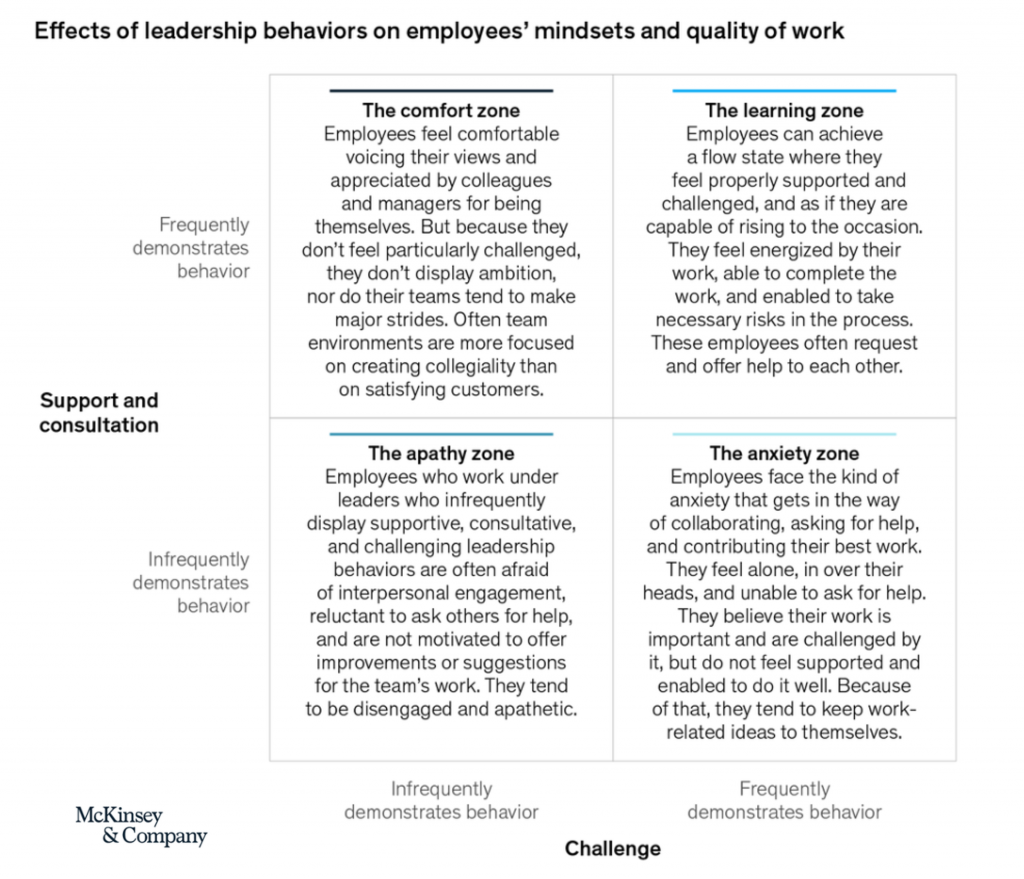Human Resources
Psychological safety and the essential role of organisational leaders

Human Resources: When employees feel comfortable asking for help, sharing suggestions or challenging the norm without fear of negative consequences, organisations are more likely to innovate quickly, unlock the benefits of diversity and adapt well to change. These capabilities have grown in importance during the COVID-19 crisis.
Yet a McKinsey Global Survey conducted during the pandemic confirms that only a handful of business leaders often demonstrate the positive behaviours that can instil psychological safety in their workforce.
Investing in and scaling up leadership-development programs can equip leaders to embody these behaviours and consequently cultivate psychological safety across the organisation.
The McKinsey research found that a positive team climate – in which team members value one another’s contributions, care about one another’s well-being, and have input into how the team carries out its work – is the most important driver of a team’s psychological safety. By setting the tone for the team climate through their own actions, team leaders have the strongest influence on a team’s psychological safety.
The survey showed that team leaders’ authoritative-leadership behaviours are detrimental to psychological safety, while consultative- and supportive-leadership behaviours promote psychological safety.
The results also suggest that leaders can further enhance psychological safety by ensuring a positive team climate. Both consultative and supportive leadership help create a positive team climate, though to varying degrees and through different types of behaviours
With consultative leadership, which has a direct and indirect effect on psychological safety, leaders consult their team members, solicit input, and consider the team’s views on issues that affect them. Supportive leadership has an indirect but still significant effect on psychological safety by helping to create a positive team climate; it involves leaders demonstrating concern and support for team members not only as employees but also as individuals. These behaviours also can encourage team members to support one another.
Another set of leadership behaviours can sometimes strengthen psychological safety, but only when a positive team climate is in place. This set of behaviours, known as challenging leadership, encourages employees to do more than they initially think they can.
A challenging leader asks team members to re-examine assumptions about their work and how it can be performed in order to exceed expectations and fulfil their potential. Challenging leadership has previously been linked with employees expressing creativity, feeling empowered to make work-related changes, and seeking to learn and improve.
However, the survey findings showed that the highest likelihood of psychological safety occurs when a team leader first creates a positive team climate, through frequent supportive and consultative actions, and then challenges their team. Without a foundation of positive climate, challenging behaviours have no significant effect. Employees’ experiences look very different depending on how their leaders behave, according to Amy Edmondson, the Novartis Professor of Leadership and Management at Harvard Business School.
The survey highlighted that a climate conducive to psychological safety starts at the very top of an organisation. McKinsey sought to understand the effects of senior-leader behaviour on employees’ sense of safety and found that senior leaders can help create a culture of inclusiveness that promotes positive leadership behaviours throughout an organisation by role-modelling these behaviours themselves. Team leaders are more likely to exhibit supportive, consultative and challenging leadership if senior leaders demonstrate inclusiveness.
According to the data, fostering psychological safety at scale begins with companies’ most senior leaders developing and embodying the leadership behaviours they want to see across the organisation. Many of the same skills that promote positive team-leader behaviours can also be developed among senior leaders to promote inclusiveness.
Open-dialogue skills allow leaders to explore disagreements and talk through tension in a team. This skill is strongly associated with positive leadership behaviours.
Training in sponsorship – that is, enabling others’ success ahead of one’s own – supports both consultative- and challenging-leadership behaviours, yet just 26% of respondents said their organisations include the skill in leadership development programs. Development of situational humility, which 36% of respondents said their organisations address, teaches leaders how to develop a personal-growth mindset and curiosity. Addressing these skills is predictive of leaders displaying consultative behaviours.
Given the quickening pace of change and disruption and the need for creative, adaptive responses from teams at every level, psychological safety is more important than ever. The organisations that develop the leadership skills and positive work environment that help create psychological safety can reap many benefits, from improved innovation, experimentation and agility to better overall organisational health and performance.
News & Trends - Pharmaceuticals

Federal Health Minister succumbs to pressure, commits to extra meeting to clear PBAC backlog
Pharma News: The Minister for Health and Aged Care, Mark Butler MP, has confirmed that the Pharmaceutical Benefits Advisory Committee […]
MoreNews & Trends - MedTech & Diagnostics

Medtech company partners with Aussie researchers in AI technology for GI cancer detection
MedTech & Diagnostics News: To develop a next-generation gastrointestinal (GI) flexible endomicroscope equipped with edge-artificial intelligence (AI) technology, Monash University’s […]
MoreNews & Trends - Pharmaceuticals

Local oncologists first to enrol prostate cancer patients in phase 3 theranostics trial
Pharma News: GenesisCare oncologists have achieved a significant milestone, becoming the first to enrol and deliver patient treatment in a […]
MoreHuman Resources

Ipsen’s culture of ‘collaboration and diversity’ earns Great Place to Work certification
Ipsen Australia and New Zealand has announced its certification as a Great Place to Work in 2024, joining 11 other […]
More